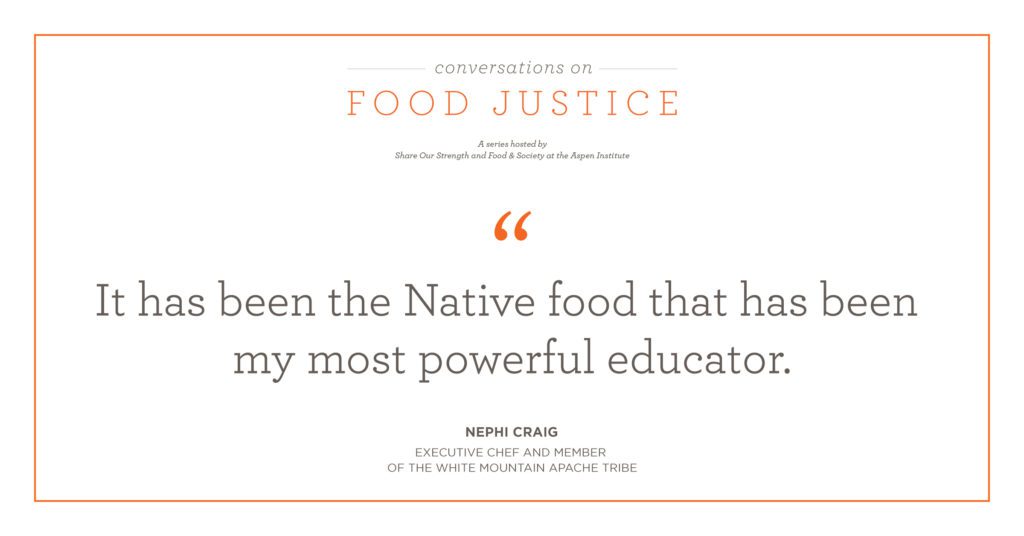Food Sovereignty: Food and Justice for Native Peoples
The fourth installment of the Conversations on Food Justice Series – a collaboration between Share Our Strength and Food & Society at the Aspen Institute- explored the importance of food in the fight for justice for Native American communities.
Speakers included Sanjay Rawal, award winning filmmaker and director of the film Gather, Nephi Craig, executive chef of Cafe Gozhoo, food activist and member of the White Mountain Apache tribe, and Sam Schimmel, youth climate activist and member of the Cook Inlet Tribal Council. The conversation was moderated by Nikki Pitre, executive director at the Center for Native American Youth at the Aspen Institute.
Here we present three takeaways from this insightful conversation:
Food is a Path to Sovereignty
Speakers highlighted the importance of food in creating community growth and reclaiming the culture of Native communities. For them, food has memory. It can either connect you to your roots or create trauma. They spoke how native people received commodity foods, like spam and canned fish, as a band-aid whenever they couldn’t access their traditional meals, and the trauma associated with it.
Chef Craig and Schimmel have taken food as a path of connection to their communities and generating growth.
Schimmel launched Operation Drop Fish, an initiative to support Native families affected by COVID-19 in Alaska. When delivering fish to remote communities, he was able to connect to his community and support their representation by assisting them with the completion of the census.
For Craig, who is featured in Rawal’s movie Gather, food has been a lifelong passion. He grew uneasy at the fact that Native food was never represented in any of his culinary training. He connected with elders in his community to learn more about their traditional foods which had a transformative effect on him, and decided to focus not on creating Native meals for the world to see, but rather creating them for Native communities themselves.
“It has been the Native food that has been my most powerful educator,” he shared. “It was not academia that brought me to mental health, decolonization, indigeneity, health disparities and creating pathways.”

Food Sovereignty is Intrinsically Connected to the Protection of the Land
Rawal, who migrated from South Asia, shared his experience as a non-native and an immigrant. “There’s very few of us migrants that have an understanding of what it means to be connected to this land. There’s a sentiment of ‘if something bad happens I can move’.”
However, he argued that for Native people, land has an essential connection to their spiritual and cultural identity that they didn’t have a choice.
Schimmel echoed the sentiment of the importance of land for Native culture. He mentioned that climate change had significantly affected hunting and fishing in Alaska, which are essential for sustaining Native culture and food security in his community. The impact had created significant mental health effects in these communities.
“The food insecurities in Alaska are ones that are incredibly real and incredibly impactful.” He shared, “the impact of an empty refrigerator on a child’s mind is detrimental on their ability to learn and grow. Until you have food, water, and shelter, you can’t pursue any other needs. We’re just trying to get the bare minimum. A lot of our time is spent on that instead of pursuing community growth”
Schimmel argued that the Western way of land management ignored a lot of the cultural practices that supported a healthy environment in which Native communities can develop.
Native People Need Support but not Saviorism
Speakers ended the conversation with a call to support Native groups.
They said the best to support is to ask these communities what they need instead of focusing on creating solutions that come from the top down. There are thousands of efforts by youth and community organizations already doing great work in terms of sovereignty and protection of the land.
Rawal advised people to look up Native tribes in their local area, and to your own privilege and power to support them, elevate their voices and give them space within leadership.
Finally there was a strong call to just get informed, follow Native chefs and community groups, and to use social media as a way to build healthy relationships with Native communities.
The Food Justice Conversation Series will continue in late April with a conversation building on this one addressing food sovereignty in Hawaii. Please email foodjustice@strength.org to share any feedback, ideas or suggestions on topics you would like to see covered.